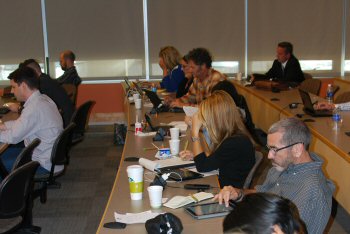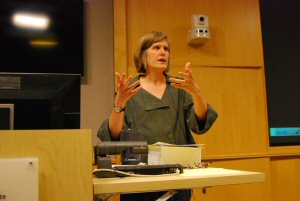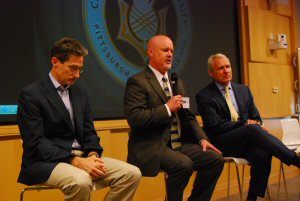Find fellowships, conferences, grants and awards deadlines, workshops and networking opportunities, crowd-sourced leads to job banks, reporting toolkits, hundreds of MOOCs and more. GO >>
 |
|
SRI fellows listen to a workshop discussion. Photo courtesy Dale Willman. |
The Society of Environmental Journalists hosted a McCormick Specialized Reporting Institute (SRI) on Shale Gas and Oil Development, June 22-24, 2014 in Pittsburgh, PA, to help journalists understand the legal, scientific, health and economic issues surrounding shale gas and oil development, and give them the context needed so that they can better inform their communities about these important topics. Funding for the SRI was provided by the Robert R. McCormick Foundation, which covered fellows' transportation, housing, food and tuition costs. Below are resources resulting from that event and more.
Session videos:
- Sunday night opening panel.
- Monday Panel 1: ABCs of Fracking.
- Monday Panel 2: ABCs of Health Impact.
- Monday Panel 3: Policy and More.
- Monday Panel 4: Environmental Effects.
- Monday Panel 5: The Legal Landscape.
- Keynote speaker: Sandra Steingraber.
|
TWITTER HANDLES TO FOLLOW @eia.org: The Energy Information Administration, which provides information and statistics on energy issues @BeyondNatGas: Twitter account for the Sierra Club’s Beyond Natural Gas campaign @MWenergynews: Midwest Energy News, a non-profit news site @fractracker: Tweets from Frac Tracker @insideclimate: Twitter feed from InsideClimate, a non-profit news organization covering energy issues @TheDailyClimate: Twitter feed from The Daily Climate, another non-profit news organization |
|
FACEBOOK PAGES Sandra Steingraber’s page for her most recent book, where a group of volunteers update daily with information on fracking (anti) Knitting Nannas Against Gas (anti) 1,000,000 Strong Against Fracking (anti) Farmers Against Fracking (anti) Frack OFF (anti) Chihuahuavsfracking (anti) Pennsylvania Fracking (pro) Energy in Depth (pro) Energy from Shale (pro) |
|
STATE GOVERNMENT CONTACTS Colorado Oil and Gas Conservation Commission (part of the state’s Dept. of Natural resources). Media Contact: Matt LePore; matt.lepore@state.co.us; (303) 894-2100, x5122 Todd Hartman (Colo. Dept. of Nat. Resources); todd.hartman@state.co.us; (303) 866-3311, x8665 Kansas Corporation Commission. Media Contact: Jesse Borjon; j.borjon@kcc.ks.gov; (785) 271-3269 Maryland does not yet have fracking, but is working on a three year study of the issue – documents on that study are available on the state’s website. Maryland Department of the Environment media contact: Jay Apperson; jay.apperson@maryland.gov; 410-537-3012 (o); 443-604-0091 (m). David Vanko chairs the state’s Safe Drilling Advisory Commission; dvanko@towson.edu; (410) 704-2121 The Missouri Geological Survey regulates oil and gas, but the state does not currently have fracking underway. Media Contact: Gena Terlizzi; gena.terlizzi@dnr.mo.gov New Mexico Environment Department. Media Contact: Jim Winchester; jim.winchester@state.nm.us; (505) 231-8800 (mobile) North Dakota Dept. of Mineral Resources – because of location, Lynn Helms, the state’s director of Mineral Resources is the top regulator in the Bakken Shale play. Media Contact: Alison Ritter; amritter@nd.gov; (701) 328-8036 North Carolina’s Department of Environment and Natural Resources – The state legislature recently passed a law intended to jump-start oil and gas drilling in the state. Media Contact: Jamie Kritzer; Jamie.Kritzer@ncdenr.gov; (919) 707-8602 Ohio’s Department of Natural resources – Ohio’s Oil and Gas Division chief, Rick Simmers, has opened a conversation with other states about how best to regulate earthquakes related to water and gas disposal. Media Contact: Bethany McCorkle; Bethany.McCorkle@dnr.state.oh.us Oklahoma Corporation Commission. Media Contact: Matt Skinner; m.skinner@occemail.com; (405) 521-4180 Pennsylvania Department of Environmental Protection. Scott Perry; Deputy Secretary, Office of Oil and Gas Management, Pennsylvania Department of Environmental Protection; scperry@pa.gov Texas Railroad Commission. Media Contact: Ramona Nye; Ramona.nye@rrc.state.tx.us; (512) 463-4817 |
|
ACTIVIST GROUP RESOURCES Denton DAG, working for a ban on fracking in the city of Denton, TX. A list of groups writing reports on fracking while accepting money from energy companies. "DeSmog Article Sparks International Investigation into BC and Canada's Carbon Emissions," DeSmog Canada, June 19, 2013, by Stephen Leahy. |
|
INDUSTRY RESOURCES American Petroleum Institute’s primer on Hydraulic fracturing. Pennsylvania Independent Oil and Gas Association (PIOGA), representing independent producers, marketers and service companies. PIOGA page outlining the hydraulic fracturing process – includes a list of some of the basic additives used in the fracturing process. |
Web Resources
- A primer on modern shale gas, produced by the Department of the Interior in 2009, and an update to that primer.
- FracTracker, an alliance that shares maps, data and other information of interest to communities affected by shale development.
- A report on water demand for shale development, with data for various plays across the country. From sustainable business group CERES.
- National Academies workshop on Governance of Risks of Shale gas Development, including videos and links to other data.
- Cost and benefit case studies for four counties in Pennsylvania, Ohio and West Virginia.
- Charts and Data for eastern shale plays.
- Using Dept. of Transportation evacuation guidelines to show communities who might be in potential danger in the event of a train derailment.
- Hydraulic fracturing information sheet, and links, from Physicians for Social Responsibility.
- Shale gas policy podcast from Carnegie Mellon University.
- Information on the Tuscaloosa Marine Shale, an oil play in the gulf region of the U.S. Similar information available on the Haynesville Shale.
- Earthworks’ Oil and Gas Accountability Project.
- The oil and gas industry’s exemptions to major environmental laws – Earthworks.
- Hydraulic Fracturing primer – Earthworks.
- U.S. Dept. of Energy’s reports on Shale Gas Production.
- SkyTruth uses satellites to 'expose environmental misdeeds'.
- Chemicals in natural gas operations – TEDX.
Data and Statistics
- Released jointly on Dec 10, 2014: 1) Toward an understanding of the environmental and public health impacts of shale gas development: an analysis of the peer reviewed scientific literature, 2009-2014, Physicians Scientists & Engineers (PSE) for Healthy Energy. [Key highlights: 96% of all papers on health indicate risks/adverse health outcomes; 95% of all original research studies on air quality indicate elevated concentrations of air pollutants; 72% of original research studies on water quality indicate contamination or risk thereof.] 2) Compendium of scientific, medical, and media findings of risks and harms of fracking (second edition), Concerned Health Professionals of New York, Dec 10, 2014. See also coverage of the joint release: "Offering a case against fracking," Albany Times Union, Dec 11, 2014, by Brian Nearing.
- The latest in fracking health studies from ProPublica.
- Energy Information Administration’s natural gas page.
- The Federal Government’s weekly natural gas storage report.
Blogs Worth Reading
- BlueDaze Drilling Reform, Texas.
- Shale Forum, an activist website containing much information, lists its blogs here.
- Shale Reporter, a website with news concerning development in the Marcellus Shale region, has several blogs on its site.
 |
|
Workshop fellows tour the Center for Sustainable Landscapes, Phipps Conservatory, Pittsburgh. Photo courtesy Dale Willman. |
What Others Are Doing
- ProPublica’s ongoing coverage of fracking.
- Coverage of fracking by InsideClimate News.
- Pennsylvania company EQT has offered money to some families living near drilling sites in return for release from legal liability for harm, from Huffington Post.
- Radionuclides in Fracking Wastewater, from Environmental Health Perspectives.
- The controversy over the term ‘fracking,’ from National Public Radio.
- Lehigh student website on the Marcellus Shale play.
- A database of hundreds of articles on fracking, from Physicians, Scientists and Engineers for Healthy Energy.
Find an Expert
- Mark K. Bowling; General Counsel and Secretary, Southwestern Energy, based in Houston, TX; Mark_Boling@swn.com
- Walter M. Brasch; author of "Fracking Pennsylvania"; brasch@walterbrasch.com; 570-784-2460
- Mark Brownstein; Associate Vice President, Chief Counsel, U.S. Climate and Energy Program, Environmental Defense Fund; EDF works with industry on natural gas issues; mbrownstein@edf.org
- Center for Sustainable Shale Development; Susan Packard LeGros, President and Executive Director; (412) 804-4170
- Stephen Cleghorn; Pennsylvania farmer-activist; jstephencleghorn@yahoo.com
- Jared L. Cohon; former President, Carnegie Mellon University; Director, Scott Institute for Energy Innovation; Chair, Center for Sustainable Shale Development; cohon@andrew.cmu.edu
- Louis D’Amico; President and Executive Director, Pennsylvania Independent Oil and Gas Association; lou@pioga.org
- John Dernbach; Professor of Environmental Law, Widener University, co-director of the university’s Environmental Law Center; speaks on the legal aspects of shale development; jcdernbach@widener.edu; (717) 541-1933
- Terry Engelder; Professor of Geosciences, Penn State; expert on the Marcellus Shale gas play; engelder@geosc.psu.edu; (814) 865-3620
- Bernard D. Goldstein, MD; an environmental toxicologist who has written about the potential for unseen threats to human health caused by shale development; bdgold@pitt.edu
- Ben Grumbles; President, U.S. Water Alliance; served as EPA’s Assistant Administrator of Water under President George W. Bush; bgrumbles@uswateralliance.org
- Jason Hutt; Attorney, Bracewell and Giuliani; knowledgeable about the national legal landscape, as well as state and local issues associated with the Marcellus, Eagle Ford and Bakken plays; jason.hutt@bgllp.com; (202) 828-5850
- Anthony R. Ingraffea; Dwight C. Baum Professor of Engineering, Cornell University; expert in modeling and testing of complex fracturing processes; one of the developers of the modern fracking techniques used today; ari1@cornell.edu; (607) 255-3336
- Lisa McKenzie; Research Associate, Colorado School of Public Health at the University of Colorado; conducts work on air quality around fracking sites; lisa.mckenzie@ucdenver.edu; 303.724.5557
- Andrew Place; Corporate Director, Energy and Environmental Policy; EQT Corporation, a natural gas industry operator; aplace@eqt.com
- Deborah Lawrence Rogers; Executive Director, Energy Policy Forum; a former financial consultant for several Wall Street firms, member of the Department of Interior’s U.S. Extractive Industries Transparency Initiative (USEITI); deborah300@sbcglobal.net
- Doug Shields, a former Pittsburg City Councilman who was involved with getting a fracking ban approved in Pittsburgh; douglas.shields20@gmail.com;(412) 422-0272
- John M. Smith, lawyer knowledgeable on matters concerning the Marcellus Shale play; jsmith@smithbutzlaw.com; (724) 745-5121
- Sandra Steingraber; a Distinguished Scholar in Residence at Ithaca College, biologist and author, writes and speaks on the human rights aspects of shale development; ssteingraber@ithaca.edu
- Sharon Wilson is an activist who has been blogging about fracking in Texas for years; txsharon.blog@gmail.com
Articles
- "In South, Wisconsin Sand Ties into Environmental Concerns Caused by Fracking," Wisconsin Public Radio, November 17, 2014, by Chuck Quirmbach.
- "Oil, Gas Boom Taps Rush of Ordinances and Bans Across the U.S.," The Denver Post, July 27, 2014, by Mark Jaffe.
- "Oil Drilling in North Dakota Raises Concerns About Radioactive Waste," Los Angeles Times, July 26, 2014, by Neela Banerjee.
- Midwest-born 'Toxic Avenger' Speaks out in the Marcellus," Midwest Energy News, July 2, 2014, by Kari Lydersen.
- "Canada's Environmental Activists Seen As 'Threat to National Security'," The Guardian, February 14, 2013, by Stephen Leahy.
- "Drilling Down series," The New York Times, 2011-2012, by Ian Urbina (includes thousands of pages of unique documents and reporting).
 |
 |
|
Keynote speaker Sandra Steingraber speaks to workshop Fellows about the human side of fracking. Both photos courtesy Dale Willman. |
Panelists (l-r: Ben Grumbles, U.S. Water Alliance; Scott Perry, Pennsylvania DEP; Andrew Place, EQT) speak to participants about Shale development policy and transparency. |













 Advertisement
Advertisement 



